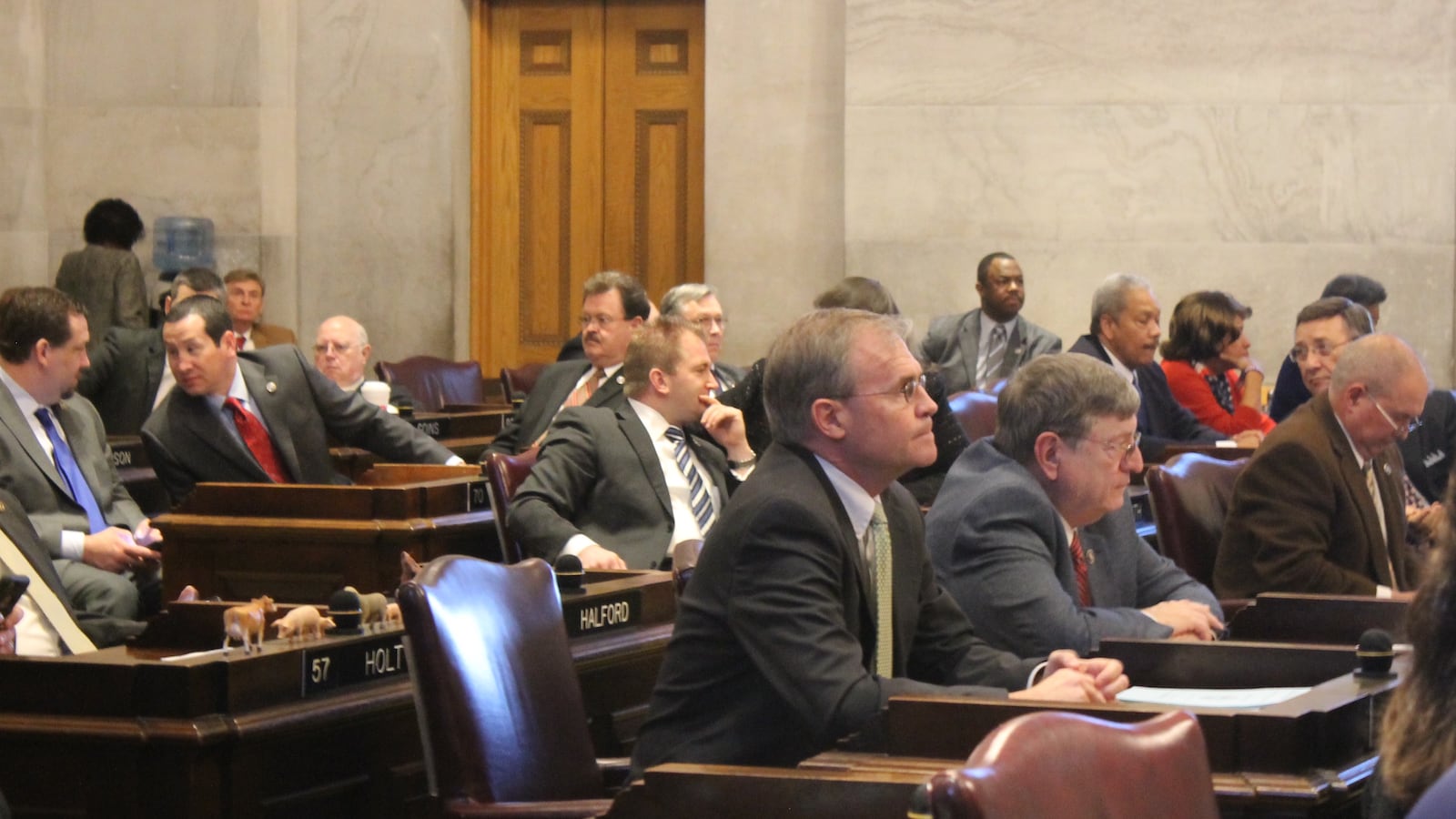A bill that until recently seemed assured to introduce school vouchers in Tennessee flew off the table Thursday morning after its chief advocate realized it would not pass.
Rep. Bill Dunn of Knoxville shocked allies and opponents alike when he announced on the floor of the House of Representatives that he would not bring the voucher legislation to a vote. The bill, which would have allowed poor students in low-performing schools to use public funding to pay private school tuition, had come closer than ever to passing after six years of review.
“There’s no reason to have four hours of debate if I don’t have the votes,” Dunn explained later.
Stay updated on Tennessee education news with our daily newsletter. Sign up here.
Lawmakers had arrived at the state Capitol in Nashville anticipating a long debate. Some even brought a bevy of snack foods to sustain them through the discourse.
But a tense exchange with a leading opponent early in the day revealed Dunn’s reservations. He rode the elevator to the House floor with Jim Wrye, the lobbyist for the Tennessee Education Association, which has fiercely argued that vouchers do not help students who use them while also draining money from public school systems.
Dunn, unsmiling, gauged opposition to the bill by asking Wrye how many legislators the lobbyist was still trying to convince to vote against it.
“I don’t know. Not many. You?” Wrye asked.
“Not many,” Dunn said, indicating that the vote would be close.
Moments later, Dunn announced to his colleagues that he did not feel comfortable bringing the bill to a vote.
“I’ve been carrying this bill I guess for four years,” Dunn said, voice strained with emotion. He indicted opponents of the legislation as uncaring. “In four years, I’ve received thousands of emails and phone calls, and they’ve all said, ‘Don’t take our money.’ But never once have they said, ‘Don’t take our kids.’”
The surprise decision leaves the future of vouchers in Tennessee in the air. The legislation enjoyed unprecedented momentum this year, making it to the House floor for the first time after being passed in the state Senate three out of six years.
That momentum shifted in recent days. Lawmakers filed last-minute amendments that would limit vouchers to Shelby County in Memphis and to introduce rules that would reduce incentives for private schools to accept the vouchers.
“The momentum’s not there,” Dunn told Chalkbeat later. Asked if the voucher legislation is off the table for the year, he said, “In my opinion, it is. … I don’t think people want to bring it back.”
Dunn attributed the tide shifting this week to “the lies from the other side that put doubt in other people’s heads.” He specifically cited the Tennessee Education Association, the state teacher association, also known as TEA.
“The whole path of this bill has been attacked by lies — lies that said there was no accountability when the bill actually said that there was,” Dunn said. “They said this had never worked before when there are dozens of studies that show that it has. So truth didn’t win out today.”
In fact, researchers haven’t reached consensus on the impact of vouchers on student achievement, which have been pushed by advocates of free markets and limited government since the 1950s, and have been implemented in some states since the early 1990s.
TEA Executive Director Carolyn Crowder said that “there are numerous studies that say it hasn’t (worked).” She said the bill’s seeming defeat was due to calls and emails from teachers, administrators, parents and “a broad coalition of public school supporters” to legislators asking them not to siphon off public school funding.
“The point is that the people of Tennessee did not want this legislation, and that’s why it went down,” she said.
While doubting that the bill will be resurrected this year, Dunn said it’s still possible if he can get the 50 votes necessary. “Technically, it is still alive on the desk and can be brought up,” he said.
Vouchers had never made it to the House floor before, although the proposal had become a fixture on the legislative agenda. The measure passed in the Senate last year during the first half of the legislative session, and Gov. Bill Haslam has said he would sign the legislation if it reached his desk.

Legislators from Shelby County were grateful for the turn of events. An amendment filed Wednesday to limit the program to Memphis caused an onslaught of calls and emails to their offices from constituents, concerned about the implications for Memphis schools.
“Obviously when you have a slew of amendments at the last minute that really change the bill, you really do need to slow things down,” said Rep. Raumesh Akbari, a Democrat. “I was surprised, but I am happy. Leadership in the Shelby County school system, legislators from Shelby County — I mean, we just got this amendment yesterday afternoon. We were still trying to digest it.”
“Being a 35-year teacher in Memphis City Schools, I know they are not failing schools,” said Rep. Barbara Cooper, another Memphis Democrat who has been a vocal opponent of vouchers. “Knowing that the people who make decisions do not live in Shelby County, have really had no contact with our children, … they shouldn’t experiment kids on Shelby County. That’s just not fair.”
But Dunn had a different perspective when asked whether Memphis students were being used as “guinea pigs” on education reform efforts.
“I feel sorry for the parents who have children in failing schools. All we did was try to help them and unfortunately for another year they’re going to be on the path to failure,” he said.

